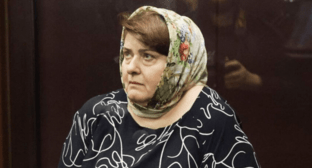04 January 2021, 16:43
Week in the Caucasus: review of main events of December 28-January 3, 2020
New Year celebration; return of refugees, victims of explosions, and search for dead bodies in the Karabakh conflict zone; attack on policemen in Grozny, – see the review of these and other events in the Caucasus during the week of December 28-January 3, 2020, prepared by the "Caucasian Knot".
New Year celebration
In a number of the regions of Southern Russia, New Year's festivities and public events were cancelled because of the coronavirus restrictions. In Stavropol, the President Vladimir Putin's New Year greetings were broadcast live on a city square. In Makhachkala, New Year's concerts were held at different venues. Meanwhile, local residents considered the New Year celebrations to be dangerous. According to the local residents, hundreds of people gather for events organized by the City Mayoralty, and many of them do not wear masks.
Azerbaijan celebrated the New Year holiday under strict quarantine. Some residents of Baku have found a way to bypass the restrictions and invite their relatives and friends. The holiday was overshadowed not only by the drop in incomes and thecomplicated epidemiological situation, but also by the grief over the thousands of deceased soldiers. Some residents of the country said they believed no celebrations were appropriate soon after the bloody battles.
Return of refugees, victims of explosions, and search for dead bodies in Karabakh conflict zone
Refugees continue to return to their houses in Nagorno-Karabakh. According to the Russian Ministry of Defence (MoD), by January 3, with the support of Russian peacekeepers, over 47,000 refugees had returned to Karabakh. The Russian peacekeepers also help to rebuild infrastructure facilities and demine the conflict zone. By January 3, the Russian peacekeepers had defused more than 16,000 explosive ordnances on over 400 hectares of terrain. Meanwhile, two persons fell victim to explosions in the Karabakh conflict zone last week. On January 1, 39-year-old Azerbaijani citizen Zabil Babaev illegally entered non-mined territory in the Fizuli District and was fatally injured. On January 2, Vasif Uzeir oglu Magerramov, a soldier of the Azerbaijani army, was killed in a mine explosion in the Gubadli District.
Karabakh rescuers found 11,038 bodies of deceased soldiers, the Ministry for Emergencies (MfE) of Nagorno-Karabakh reported.
Coronavirus infection spread statistics in Caucasus
Over the past week, Georgia still leads in Southern Caucasus in the number of coronavirus-infected patients, while Armenia leads in the COVID-19 death toll. By January 3, the number of coronavirus-infected people in Georgia reached 229,169, in Azerbaijan – 220,265, in Armenia – 160,027, in Abkhazia – 8825, in Nagorno-Karabakh – 1484, and in South Ossetia – 2319.Armenia has already registered 2850 deaths from COVID-19, Azerbaijan – 2733, Georgia – 2603, Abkhazia – 118, Nagorno-Karabakh – 16, and South Ossetia – 60.
Over the past week, the Rostov Region, where 52,828 cases of infection were registered, still leads in Southern Russia in the number of coronavirus-infected patients. The Volgograd Regionwith 36,229 COVID-19 patients follows the Rostov Region. In theStavropol Territory, 35,813 people were diagnosed with the coronavirus infection, in the Krasnodar Territory – 28,292, Dagestan – 23,939, the Astrakhan Region – 19,537, Kabardino-Balkaria – 16,126, Karachay-Cherkessia – 15,390, Kalmykia –15,068, Ingushetia – 12,358, North Ossetia – 12,270, Adygea –11,261, and Chechnya – 9003.
Over the past week, the Rostov Region registered the highest COVID-19 death toll – 2111. In Dagestan, 1132 patients diagnosed with the coronavirus infection died, in the Krasnodar Territory – 977, in the Stavropol Territory – 755, in the Volgograd Region – 474, in the Astrakhan Region – 397, in Kabardino-Balkaria – 266, in Kalmykia – 200, in Ingushetia – 142, in North Ossetia – 101, in Chechnya – 94, in Adygea – 93, and Karachay-Cherkessia – 41.
Attack on policemen in Grozny and declaration of blood feud on relatives of killed suspected militants
On December 28, a policeman was killed in an attack in Grozny, and his colleague was wounded. Ramzan Kadyrov reported that two militants from Ingushetia who had moved to Chechnya in 2012 were killed. The "Islamic State" (IS, a terrorist organization, banned in Russia by the court, – note of the "Caucasian Knot")claimed responsibility for the attack on the police. The attack became the second armed incident in Chechnya in 2020 with casualties from among law enforcers. Armed attacks in Chechnya come amid the glorification of rioters like Abdullakh Anzorov, who beheaded a teacher in Paris, as well as the discontent with the local authorities and the expansion of a new grouping associated with the IS, analysts note.
Members of the Ingush Timurziev and Sultygov teips (family clans) requested Ramzan Kadyrov to provide evidence that the killed suspects were terrorists. Magomed Daudov, the speaker of the Chechen parliament, offered them a meeting to watch a video with evidence of the guilt of the killed suspects and warned them about blood feud on the part of the victim's relatives. Later, the members of the Timurziev and Sultygov teips stated that they had watched the video from the scene, which clearly depicted the actions of the attackers. The Timurziev and Sultygov teips admitted they were wrong and expressed their condolences to the family of the killed policeman. Analysts call in question the sincerity of the above admission. Although the relatives of the Ingush natives killed in Grozny expressed their condolences to relatives of the deceased policeman, they faced a declaration of blood feud. Later, members of the Ersno teip, relatives of the wounded policeman, also declared enmity with the Ingush Timurziev and Sultygov teips.
This article was originally published on the Russian page of 24/7 Internet agency ‘Caucasian Knot’ on January 4, 2021 at 09:18 am MSK. To access the full text of the article, click here.




